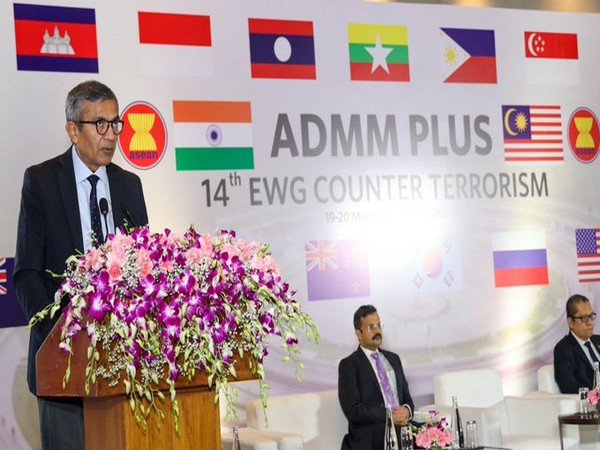New Delhi [India], March 19 : Defence Secretary Rajesh Kumar Singh emphasized ASEAN’s commitment to adopting a “Whole of Government and Whole of Society” approach to combat radicalization and violent extremism during the inaugural session of the 14th Experts Working Group (EWG) Counter Terrorism meeting of the ASEAN Defence Ministers’ Meeting-Plus (ADMM-Plus) in New Delhi.
Singh highlighted India’s active participation in ASEAN-led mechanisms, stating, “India has been an active participant in all ASEAN-led mechanisms, including the ASEAN-India, East Asia Summit, ADMM-Plus, ASEAN Regional Forum, and the expanded ASEAN Maritime Forum. These are key building blocks of an emerging ASEAN-centered regional security architecture.”
Addressing the ongoing challenge of terrorism, Singh remarked that decades of cross-border terrorism have not weakened India’s resolve to fight all forms of terrorism. He reiterated India’s determination to tackle security threats, particularly in the Indo-Pacific region, which faces traditional and non-traditional security challenges such as terrorism, cyber threats, narcotics trade, and the proliferation of new technologies.
“Terrorism remains a dynamic and evolving challenge, with threats increasingly transcending national borders. The use of advanced technology, cyber tools, unmanned systems by terrorist groups requires a cohesive, forward-looking, and action-oriented approach,” Singh said, stressing the vulnerability of the Indo-Pacific region to transnational terrorism.
India’s steadfast commitment to a zero-tolerance policy towards terrorism was reiterated, with Singh emphasizing a holistic approach involving robust domestic mechanisms, enhanced intelligence sharing, and strong regional cooperation. India supports the 2018 joint statement by ASEAN Defence Ministers on countering terrorism, which highlights the rise of increasingly sophisticated terrorist tactics and the importance of collaboration among ASEAN countries and dialogue partners.
Singh also noted the significance of the meeting in fostering meaningful and practical results in the fight against terrorism. “Terrorism can destabilize governments, undermine civil society, and threaten social and economic development. We have a collective obligation to provide guidance to decision-makers on how to understand and counter these threats,” he said.
The Defence Secretary further stressed the focus on countering the misuse of emerging technologies, including AI-driven propaganda, encrypted communications, drones, and unmanned technologies. He also called for strengthening cyber resilience to combat online radicalization and recruitment efforts.
“We aim to develop a holistic approach to counterterrorism by promoting a whole-of-government and whole-of-society strategy to counter radicalization and violent extremism while enhancing legal and financial frameworks to disrupt terror financing networks,” Singh concluded.
The 14th EWG Counter-Terrorism meeting of ADMM-Plus will continue in New Delhi from March 19 to 20, with discussions centered on enhancing joint efforts to combat terrorism in all its forms.


